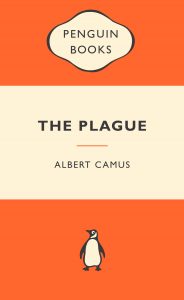The Plague, Albert Camus, France, 1947
An infestation of rats in the town of Oran on the Algerian coast quickly develops into bubonic plague. Although the men in charge initially refuse to acknowledge that which is blindingly obvious, as people begin to die they are left with no choice but to call the illness by its right name and close the city’s gates. For almost a year the inhabitants of the town remain cut off from the rest of the world. In this restricted environment, most people want to believe that they will survive, many resorting to superstition or religion. But the plague is undiscriminating, and there is no rhyme nor reason behind who dies and who survives. Dr Bernard Rieux, together with a few friends, focuses on saving as many people as he can. While he possibly agrees with his friend Tarrou’s observation that ‘… each of us has the plague within him; no one, no one on earth, is free from it.’, and more than occasionally wonders at the absurdity of everything, Rieux does not allow such thoughts to detract him from his goal.

When the town is finally free from plague, Rieux listens to the sounds of people celebrating and reflects, ‘… that such joy is always imperilled. He knew what those jubilant crowds did not know but could have learned from books; that the plague bacillus never dies or disappears for good; that it can lie dormant for years and years in furniture and linen-chests; that it bides its time in bedrooms, cellars, trunks, and bookshelves; and that perhaps the day would come when, for the bane and the enlightening of man, it roused up its rats again and sent them to die in a happy city. ‘

This is a novel that can be read on a number of different levels. It can be read simply as an account of a town coping with an outbreak of the plague. It can also be seen as an allegory where good is attacked and confined by evil, for example, France during the Nazi occupation. Or, finally, it can be seen as a comment on the absurdity of the human situation. Nothing can protect us from the inevitable: we are all going to die. In spite of this, we go about our tasks, believing that we are immune.
No matter how we decide to interpret the novel, it is worth giving some thought to Rieux’s optimistic observation that, generally speaking, people are more good than bad, and that the most important thing we can do, in fact the only thing we can do, is to love one another.
